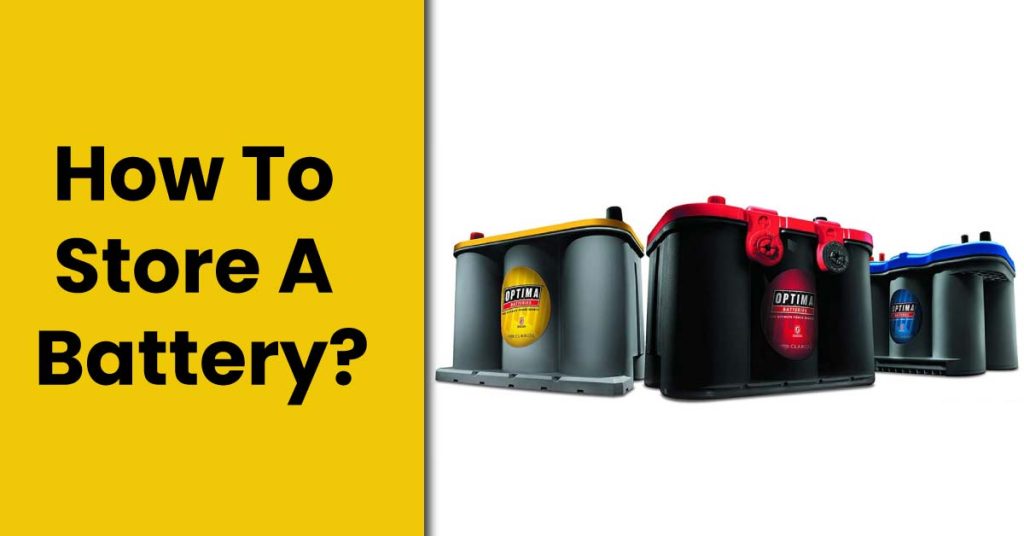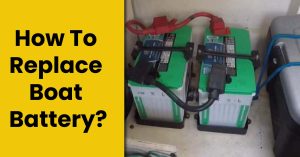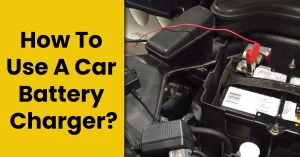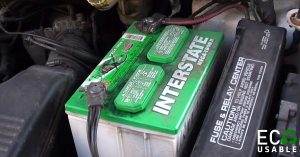How To Store A Battery With Precautionary Measures?
Have you ever opened the hood of your car and found a corroded, old, leaky battery inside it? But don’t worry! You can avoid it by reading our expert article on How To Store A Battery like a pro.
Batteries have become a ubiquitous part of modern life, powering everything from small electronic devices to cars and even homes.
As a result, it’s important to know how to properly store batteries to ensure they maintain their capacity and perform optimally over their lifespan.
Proper storage can also help prevent damage and even the risk of fire or explosion. In this guide, we will discuss the best practices for storing different types of batteries, including common household batteries such as alkaline, rechargeable, and lithium-ion batteries.
By following these guidelines, you can ensure your batteries stay in good condition and perform as expected when you need them.
Basic Battery Care
It is necessary to take care of batteries when they are not in storage. If the batteries are currently in use, they can be subject to improper handling, leaks or corrosion, if you won’t pay attention.
For different types of batteries, there are different guidelines you can follow.
For Household Batteries:
Always keep one-time-use batteries separately in their original packaging to avoid their contact with other batteries.
If you don’t have the original packaging, arrange batteries in a container where positive ends of them face in the same direction.
Avoid arranging batteries that face opposite ends of one another.
Do not store batteries at a place where anything made of metal is already present. The contact with metal will lead to short-circuiting the battery that will ultimately cause leakage.
Always store the same types of batteries together, no matter if they’re old or new. Try to avoid mixing up different types of batteries with varying power levels to be placed at the same place. There is the possibility that older batteries are capable of draining energy from newer batteries.
Check carefully if any battery is crushed or punctured while kept in storage. It is better to keep them inside a container that can’t be damaged or crushed easily. You can use this tip during traveling.
For Rechargeable Batteries:
Before use, charge your battery up to 100% of its capacity.
Rechargeable lithium-ion batteries are being used in dozens of devices today from cell phones to power tools. For keeping up these batteries in good condition, store them at 40% of their capacity.
It is essential to remove the charger of the battery after it has been fully charged. Do not keep your electrical appliances plugged in for a longer period because it will reduce the lifespan of the battery.
Checkout our guide about the top rated lawn tractor battery.
For Vehicle And Car Batteries:
The meaning to preserve a battery is actually to use it. If you’ve stored your car temporarily, take your car for a spin after a few weeks to charge its battery. If you’ve planned not to use your vehicle for months, it’d be better to remove the battery completely.
For removing the car battery, first, turn off your vehicle. Then disconnect the battery by removing black and red cables.
To avoid corrosion, clean the battery properly and then store it in a dry and safe place at a temperature neither too cold nor too hot.
Use a trickle charger to preserve the battery for a longer period while keeping it in storage.
- Check out our guide about the how to install a car battery?
How To Store A Battery

It is good to store the battery in a dry environment at room temperature or a bit colder but not at freezing temperature. Never store your batteries at places with extreme temperatures ranging from too cold to too hot.
A slightly cooling temperature can be good for enhancing the lifespan of batteries but it’s not always the case in household batteries. Below we’ve mentioned some steps to follow for properly storing a battery.
Remove Batteries From Equipment:
For storing batteries, it is necessary to remove them from their device or their charger. Storing batteries separately can help extend their lifespan. In case your battery gets damaged or leaks somehow, it will ultimately harm the device or equipment.
Make Sure Batteries Are Contained:
To ensure the safety of the battery by preventing it from damage or leaks, it is important to avoid its contact with anything of metal. A perfect to do so is by keeping them inside their original packaging to make them buffered and protected.
If you’re preferring them to be kept inside a battery storage box, there’s a variety present. I’d recommend choosing a vapor-proof container to keep moisture away from damaging the batteries.
If you don’t have access to the original packaging, you can bunch together your batteries in a rubber band and then keep them inside a plastic cover.
Also, check the positive and negative terminals and make sure to keep the same terminals in the same direction.
Separate Old And New Batteries:
It is quite obvious if you’ll keep old and new batteries together in the same packaging, it’ll result in leakage by damaging other batteries as well as your device. So, prefer to store old and new batteries separately from each other. Also, check the battery which is fully charged and which one isn’t. In this way, power won’t be lost unexpectedly from the charged battery.
To avoid any mixing of good and bad batteries, you can choose a battery tester to find it out quickly.
Keep The Temperature Down:
To get a long life for batteries it is important to avoid extreme temperatures. If you’re putting it in a storage unit, go for opting a climate-controlled facility. Some people may suggest storing batteries in a refrigerator or freezer, but it isn’t recommended at all.
Condensation taking place in the refrigerator will not only damage the battery, but prolonged exposure to the extreme cold temperature will also reduce the battery life.
I’d suggest keeping batteries in a dark and dry place at room temperature.
Control Humidity:
It is highly recommended to keep batteries in a vapor-proof container if the surrounding environment is highly humid because there can be a chance of condensation and you’ve to avoid it at its maximum. Though alkaline batteries can be stored in a moderately humid environment, many other batteries can’t be kept in humidity. Also, it is not good to store a battery on the ground.
You’re supposed to keep batteries away from direct sunlight and extreme temperatures. The best way to store batteries safely is to keep them at room temperature.
Take Valuables Into Account:
It’s a common thing that batteries can leak acids that can damage surrounding things. If you’ve stored something in the vicinity of a leaked battery, it can cause huge damage to the other thing or any valuables.
So, make sure to keep batteries away from valuables if you have a plan to store them for a longer period.
Know The Rules For Rechargeable Batteries:
You may have an idea about the types of batteries but I’ll mention them again if anyone does not know. Mainly batteries are of two types; one you use and throw and the other that is rechargeable.
In the case of a rechargeable battery, you should store it at a 40 percent charge to allow it to discharge gradually.
Recharge Lead-Acid And Lithium-ion Batteries Periodically:
Sulfation or permanent crystal formation can occur if a lead-acid battery is stored at a very low charge state that will eventually reduce the capacity.
While lithium-ion batteries can be shortened by developing copper structures at a low charge that makes them dangerous to use. You can find exact instructions for recharge on the battery design.
For a 12Volts of Lead-Acid battery, recharge to full when voltage drops below 2.07Volts per cell. You have to charge it once every six months.
For a Lithium-Ion battery, recharge to 30 to 50 percent capacity when voltage drops below 2.5Volts per cell. One charge is recommended every few months.
Restore Discharged Batteries:
There will be a need for some special treatment if the battery has been dropped to low charge levels frequently or for more than a few days.
In the case of a Lead-Acid battery, the battery will be able to recharge but with permanently reduced capacity. If a lead-acid battery of small size fails to recharge, apply a high voltage of a very small amount of current for almost two hours.
In the case of a Lithium Acid battery, the battery may go into sleep mode and can even lead to recharge failure. Use a charger that has a boost feature while keeping the voltage in correct polarity. Do not boost a battery that has already fallen below 1.5 volts per cell for a week or more because it is damaged and can be dangerous to use.
Precautionary Measures
To use, store or dispose of batteries there are some warnings as well as precautionary measures you can follow to ensure safety.
- Never place batteries in the vicinity of children such as coin-shaped lithium batteries are very harmful as kids can swallow them and can result in choking.
- Keep your batteries away from extreme temperatures taking from too hot to too cold. Also, do not leave your gadgets such as laptops inside your car for a longer period. The heat exposure can leak, explode or damage the battery.
- When a battery stops working, dispose it of immediately as keeping the depleted batteries will only cause damage to the device.
- If you’re putting a device in storage for long period, it’s recommended to remove batteries from it including toys for kids, remotes, or other related devices.
- Do not try to charge a battery that’s not mentioned as a rechargeable battery. Also, make sure to charge batteries only on their designated chargers. Even if the charger fits them, but never charge a battery by any other charger.
Recommended Guide: What is a deep cycle battery?
How Long Does An Unused Battery Last?
The lifespan of unused alkaline batteries is almost between 5 to 10 years.
It depends on a variety of factors, including the type of battery, its capacity, and storage conditions. In general, batteries that are not used for long periods of time will slowly lose their charge over time due to self-discharge.
This is because the chemical reactions within the battery continue even when it’s not in use, leading to a gradual loss of capacity.
The rate of self-discharge varies by battery type. For example, alkaline batteries have a slower self-discharge rate and can last for several years when stored in a cool, dry place. Rechargeable batteries, such as nickel-metal hydride (NiMH) and lithium-ion (Li-ion) batteries, have a faster self-discharge rate and may lose their charge within a few months if left unused.
The storage conditions also play a role in the lifespan of an unused battery. Batteries should be stored in a cool, dry place and away from direct sunlight, as high temperatures and humidity can accelerate self-discharge and reduce the lifespan of the battery.
In summary, the lifespan of an unused battery varies by type and storage conditions, but in general, alkaline batteries can last for several years, while rechargeable batteries may lose their charge within a few months if left unused. It’s always a good idea to periodically check the charge level of unused batteries and replace them as needed.
FAQs – Frequently Asked Questions
Can you store a battery in a Ziploc bag?
Yes, you can store a battery in ziplock bags. For storing at home, it’s much better to keep batteries in a battery organizer.
Do batteries drain when not in use?
This is called battery self-discharge and it happens normally.
However, the reaction could also happen at a smaller scale, when the battery’s electrodes are not connected. That means that the charge of a battery gradually reduces over time. This phenomenon is called self-discharge. That is why you can store your batteries without too much worry.

Alex Black is a seasoned electrical engineer with a remarkable 8-year track record specializing in appliances, generators, and transfer switches. With extensive hands-on experience in the field, Alex possesses a deep understanding of electrical systems and their intricate workings. Throughout their career, Alex has consistently demonstrated expertise in designing, troubleshooting, and maintaining various electrical appliances.






